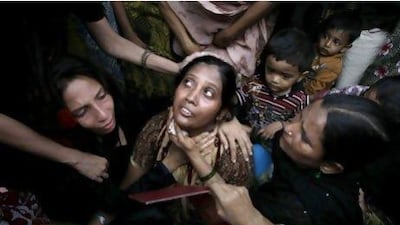KARACHI // Police yesterday pressed murder charges against factory bosses and government officials over the deaths of 289 people in the country's worst industrial disaster.
Workers suffocated or were burnt alive at the Ali Enterprises garment factory in Karachi, which made clothing for western export, when a massive fire gripped the building during the evening shift on Tuesday.
Up to 600 people were working in the building, which officials said was in poor condition without emergency exits, forcing dozens to jump from upper storeys to escape the flames.
Others were trapped in the basement, where they perished.
"We have registered a murder case against the owners of the factory and several government officials for showing utter negligence to provide adequate security to the factory workers," said Mohammad Nawaz Gondal, a police official.
The case has been filed against Abdul Aziz, Mohammad Arshad and Shahid Bhaila and other members of the management of Ali Enterprises, Mr Gondal said. The owners have not been seen since the blaze and police are hunting for them.
The government has ordered an inquiry and officials said the owners, two of whom are brothers, have been barred from leaving the country.
A retired judge will lead the investigation into the blaze, with initial findings expected in a week.
The inquiry will look into the cause of the fire, protection systems available inside the building and the extent of negligence on the owners' part, a government statement said.
Nasir Mansoor of the National Trade Union Federation said safety measures were ignored at the factory.
"At Ali Enterprises there was only one exit point for more than 500 workers at the time of the emergency, all the windows had iron grills and doorways and stairs were stuffed with finished merchandise," he said.
Karachi, Pakistan's biggest city with a population of 18 million, was in mourning yesterday over the deaths.
Public transport was suspended and schools and colleges closed. Factories and markets also shut while attendance at offices was thin.
Relatives spent a second day at hospitals, desperate for news of their loved ones, breaking into wails and sobs when medics confirmed the identity of yet another body.
With so many burnt beyond recognition, only 150 of the dead had been identified yesterday, many by DNA, and 125 bodies handed back to families for burial, said city police chief Iqbal Mehmood.
Mohammad Bakhsh, 60, burst into tears and hugged his teenage grandson outside the Civil Hospital morgue when he was informed that his son Mohammad Ashraf's body had been identified. "We are doomed, it is doomsday for us, Allah will help us to survive," he said.
Even 36 hours after the disaster began, several families still gathered outside the gutted factory hoping for news of loved ones.
Just a few firefighters were still working. There was thick smoke in the basement and it was still too hot to go inside, where boiling water formed a pool after firefighters spent hours hosing the flaming building.
"The place is too hot and smoky, it is too risky to go inside and clear the building. We are waiting for now," Ehtesham Salim, the fire department chief, said.
Ambulances continued to ply back and forth to the factory, even as funeral prayers for some of the dead had already begun.
Mohammad Aamir lost his wife Perveen in the blaze. They were both working in the three-story factory, but on different floors. When the fire started, Mr Aamir rushed up to the third floor to try to save his wife, who was working in the canteen. They tried to escape through an exit door to the roof, but it was locked.
"By the time the lock was broken, my wife died," said Mr Aamir at Perveen's funeral. "Many workers jumped on to the adjacent building to save their lives. I also jumped and got injured."
The owners locked the exit doors in response to a recent theft, several victims' relatives have said.
Mohammad Arshad, a labourer, erected a tent outside his house in a neighbourhood near the factory for the funerals of his brother and sister in law.
"My elder brother and his wife worked in the factory and both have been missing since the incident. We're not optimistic now and have arranged for their rituals once their bodies are identified," he said.
The couple's children, a 13-year-old daughter and a nine-year-old son, have not yet been informed their parents are probably dead, he said. "They are too young and already confused. We'll tell them once the bodies arrive."
* With additional reporting by Associated Press

